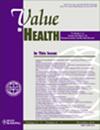Recommendations on the Use of Structured Expert Elicitation Protocols for Healthcare Decision Making: A Good Practices Report of an ISPOR Task Force
IF 4.9
2区 医学
Q1 ECONOMICS
引用次数: 0
Abstract
Healthcare decision making, including regulatory and reimbursement decisions, is based on uncertain assessments of clinical and economic value. This arises from the evidence supporting those assessments being uncertain, incomplete, or even absent. Qualitative, structured expert elicitation (SEE) is a valuable tool for extracting expert knowledge about an uncertain quantity and formulating that knowledge as a probability distribution. This creates a useful input to decision modeling and support, particularly in areas with limited evidence, such as advanced therapy products, precision medicine, rare diagnoses, and other areas with high uncertainty.
Structured SEE protocols are used to improve the transparency, accuracy, and consistency of quantitative judgments from experts, limiting the effect of heuristics and biases. This task force report introduces 5 commonly used protocols for SEE (Sheffield elicitation framework; modified Delphi method; Cooke’s classical method; investigate, discuss, estimate, aggregate protocol; and the Medical Research Council reference protocol). It describes the common elements of SEE, discusses how these protocols differ in their implementation of those elements and illustrates the use of the protocols.
The report then reviews the relevant constraints on implementing SEE within the context of healthcare decision making and considers the strengths and weaknesses of these protocols in light of those considerations. Because this is an introductory report on an emerging topic, specific recommendations on practice are not made. However, there are broad recommendations based on the suitability of the different protocols in various decision contexts. The report concludes with recommendations for further research to better guide future practice.
关于在医疗决策中使用结构化专家征询协议的建议:ISPOR 工作组的良好实践报告
医疗决策,包括监管和报销决策,都是基于对临床和经济价值的不确定评估。这是因为支持这些评估的证据不确定、不完整甚至不存在。定性、结构化的专家征询(SEE)是一种宝贵的工具,可用于提取有关不确定数量的专家知识,并将这些知识形成概率分布。结构化专家征询协议用于提高专家定量判断的透明度、准确性和一致性,限制启发式方法和偏见的影响。本特别工作组报告介绍了 5 种常用的 SEE 协议(谢菲尔德诱导框架;改良德尔菲法;库克经典法;调查、讨论、估计、汇总协议;以及医学研究委员会参考协议)。报告描述了SEE的共同要素,讨论了这些方案在实施这些要素时的不同之处,并说明了这些方案的使用方法。报告随后回顾了在医疗决策背景下实施SEE的相关限制因素,并根据这些因素考虑了这些方案的优缺点。由于这是一份关于新兴课题的介绍性报告,因此没有提出具体的实践建议。不过,报告根据不同方案在不同决策环境中的适用性提出了广泛的建议。报告最后提出了进一步研究的建议,以更好地指导未来的实践。
本文章由计算机程序翻译,如有差异,请以英文原文为准。
求助全文
约1分钟内获得全文
求助全文
来源期刊

Value in Health
医学-卫生保健
CiteScore
6.90
自引率
6.70%
发文量
3064
审稿时长
3-8 weeks
期刊介绍:
Value in Health contains original research articles for pharmacoeconomics, health economics, and outcomes research (clinical, economic, and patient-reported outcomes/preference-based research), as well as conceptual and health policy articles that provide valuable information for health care decision-makers as well as the research community. As the official journal of ISPOR, Value in Health provides a forum for researchers, as well as health care decision-makers to translate outcomes research into health care decisions.
 求助内容:
求助内容: 应助结果提醒方式:
应助结果提醒方式:


